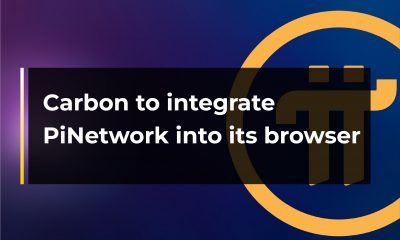Education
Browse & earn in privacy-centred Carbon browser

A web browser is a software application through which users access websites. Historically, the first known web browser launched was WorldWideWeb by Sir Tim Berners-Lee in 1990. That was followed by the Mosaic web browser in April 1993, Navigator in 1994 by Marc Andressen, Internet Explorer by Microsoft in 1995, Mozilla Firefox in 2004, Google Chrome in 2008, and others. Today, Chrome is the most popular browser with 3.2 billion users.
These browsers, which can be categorized as Web2 browsers, have served users by making search better, however, certain concerns remain. These include a lack of user privacy, spam messages from advertisers, misuse of user data, and centralized control systems by big corporations.
To solve these problems, a new generation of web browsers is being developed. These browsers known as Web3 browsers such as Carbon browser are aiming to give data ownership, privacy, and more back to users. But what is Carbon?
What is Carbon browser?
Carbon browser is a fast, more secure, and privacy-focused multichain, including PiNetwork, Polygon Edge, a decentralized supercloud by Polygon, and Akash Network, an open-source platform on Cosmos.
The app is currently available on the Google PlayStore, with plans to be featured on the iOS App store has amassed more than 5 million users after the launch of its token. It comes with Web3 features that allow users to determine how their data is used and earn while using it. Carbon is based on the fork of Chromium infrastructure.
Components of Carbon browser
- Browser: The Carbon browser is a fast, secure, and user-friendly browser with VPN and AdBlock systems which protects user privacy. Trackers are restricted from tracing users’ activities on the browser.
- Crypto wallet: Carbon features a multichain crypto wallet users can use to interact with various tokens built on different blockchains. This allows users to interact with dApps and to store cryptocurrencies and digital assets like NFTs.
- Carbon AdX marketplace: This is a service that connects big advertisers with the Carbon ecosystem. It is described as a self-serve ad marketplace where advertisers and publishers can buy & sell ads customized for the Carbon browser using the $CSIX token. According to Carbon, this service will be available for both users and non-users of Carbon.
- Carbon rewards: Carbon users can earn tokens when they use the browser, and stake $CSIX tokens. Earnings can be spent with external vendors such as Amazon, charities, and on Carbon Pro. Distribution of rewards will start from Q3 2023.
- Carbon Swap and bridge: It makes it possible to swap from one asset to another at low fees without leaving the Carbon app.
Team, partners, and community
Carbon X Labs is the company behind the Carbon browser. Part of the infrastructure used for the project is a fork of the Chromium open-source code by Google. While there is a centralized body managing the platform, between Q3 and Q4 of 2023, the community DAO will be launched to bring full decentralization into the platform.
Tokenomics
$CSIX token is the native token of the Carbon browser. It is a BEP-20 token with a total token supply of 1 billion. The token which is audited by Chainsulting serves as the utility and governance token of Carbon.
Users can purchase products and services on Carbon with the $CSIX token. It also attracts discounted fees when used in the Carbon marketplace. The team created a series of burn events for the token to control its deflationary process.
It has been launched on the BullPerks and Poolz launchpads while listing on CEXes and DEXes is part of the roadmap.
Roadmap of Carbon browser
According to the Carbon browser, Q1 and Q2 of 2023 will be about the launch of the Carbon token, especially on exchanges such as Kucoin, Pancakeswap, Gate, and BKEX; update of the app; launch of staking services; bridge and swap testnet; zkSync integration; launch of iOS testnet, and the Carbon marketplace.
Browsetoearn, Carbon PRO, campaigns on CoinMarketCap, Mac OS and PC testnet, and more will be launched between Q3 and Q4 of 2023. Further development will continue into 2024.
Read also;
Carbon to integrate PiNetwork into its browser
Brave browser integrates Solana DApp















1 Comment